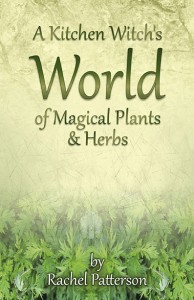 Magical herbology is an area every witch needs to develop competency in, whatever her eventual area of focus. The challenge is to gain more than an abstract knowledge of herbs, to find opportunities for hands-on learning. A Kitchen Witch’s World includes tips on ways to work herbs into your daily life and your magical routine. Over 150 common herbs are covered, which for most witches includes all that will ever be needed. Most of the herbs are easily obtained, although one important herb – mandrake – is hard to find in the United States. (Occult stores will try to sell you mayapple as “American Mandrake” instead.) The entries for each herb are fairly short, but contain a brief description of the plant or its growing habitat, which I believe is important because most beginning witches first encounter these herbs in a package.I think what I like most about this book is that it doesn’t indulge in a plethora of correspondences. The tendency to go overboard with correspondences, to the point where it begins to inhibit learning rather than adding to it, is the bane of beginners – yet correspondences do have an important, necessary role in herb magic. I think this book sets the right balance to a thorny issue.If you already work a good deal with magical herbs, to the point where you have begun growing your own, this book is probably not for you, and if you decide to make this your area of expertise you will outgrow this book in a few years. This is not an encyclopedia, and I think we’ve come to expect the encyclopedic approach to herbs, whether for magic or healing. If you would like to use magical herbs a bit more than you do at present, this would be a good resource to have.A Kitchen Witch’s World of Magical Plants and Herbs is due out this fall and can be pre-ordered on Amazon.
Magical herbology is an area every witch needs to develop competency in, whatever her eventual area of focus. The challenge is to gain more than an abstract knowledge of herbs, to find opportunities for hands-on learning. A Kitchen Witch’s World includes tips on ways to work herbs into your daily life and your magical routine. Over 150 common herbs are covered, which for most witches includes all that will ever be needed. Most of the herbs are easily obtained, although one important herb – mandrake – is hard to find in the United States. (Occult stores will try to sell you mayapple as “American Mandrake” instead.) The entries for each herb are fairly short, but contain a brief description of the plant or its growing habitat, which I believe is important because most beginning witches first encounter these herbs in a package.I think what I like most about this book is that it doesn’t indulge in a plethora of correspondences. The tendency to go overboard with correspondences, to the point where it begins to inhibit learning rather than adding to it, is the bane of beginners – yet correspondences do have an important, necessary role in herb magic. I think this book sets the right balance to a thorny issue.If you already work a good deal with magical herbs, to the point where you have begun growing your own, this book is probably not for you, and if you decide to make this your area of expertise you will outgrow this book in a few years. This is not an encyclopedia, and I think we’ve come to expect the encyclopedic approach to herbs, whether for magic or healing. If you would like to use magical herbs a bit more than you do at present, this would be a good resource to have.A Kitchen Witch’s World of Magical Plants and Herbs is due out this fall and can be pre-ordered on Amazon.
